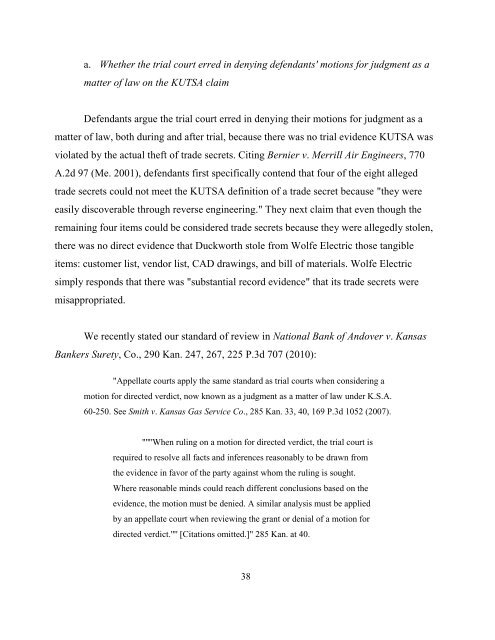Kansas Supreme Court - 99536 â Wolfe Electric, Inc. v. Duckworth
Kansas Supreme Court - 99536 â Wolfe Electric, Inc. v. Duckworth
Kansas Supreme Court - 99536 â Wolfe Electric, Inc. v. Duckworth
Create successful ePaper yourself
Turn your PDF publications into a flip-book with our unique Google optimized e-Paper software.
a. Whether the trial court erred in denying defendants' motions for judgment as a<br />
matter of law on the KUTSA claim<br />
Defendants argue the trial court erred in denying their motions for judgment as a<br />
matter of law, both during and after trial, because there was no trial evidence KUTSA was<br />
violated by the actual theft of trade secrets. Citing Bernier v. Merrill Air Engineers, 770<br />
A.2d 97 (Me. 2001), defendants first specifically contend that four of the eight alleged<br />
trade secrets could not meet the KUTSA definition of a trade secret because "they were<br />
easily discoverable through reverse engineering." They next claim that even though the<br />
remaining four items could be considered trade secrets because they were allegedly stolen,<br />
there was no direct evidence that <strong>Duckworth</strong> stole from <strong>Wolfe</strong> <strong>Electric</strong> those tangible<br />
items: customer list, vendor list, CAD drawings, and bill of materials. <strong>Wolfe</strong> <strong>Electric</strong><br />
simply responds that there was "substantial record evidence" that its trade secrets were<br />
misappropriated.<br />
We recently stated our standard of review in National Bank of Andover v. <strong>Kansas</strong><br />
Bankers Surety, Co., 290 Kan. 247, 267, 225 P.3d 707 (2010):<br />
"Appellate courts apply the same standard as trial courts when considering a<br />
motion for directed verdict, now known as a judgment as a matter of law under K.S.A.<br />
60-250. See Smith v. <strong>Kansas</strong> Gas Service Co., 285 Kan. 33, 40, 169 P.3d 1052 (2007).<br />
"'"'When ruling on a motion for directed verdict, the trial court is<br />
required to resolve all facts and inferences reasonably to be drawn from<br />
the evidence in favor of the party against whom the ruling is sought.<br />
Where reasonable minds could reach different conclusions based on the<br />
evidence, the motion must be denied. A similar analysis must be applied<br />
by an appellate court when reviewing the grant or denial of a motion for<br />
directed verdict.'"' [Citations omitted.]" 285 Kan. at 40.<br />
38
















